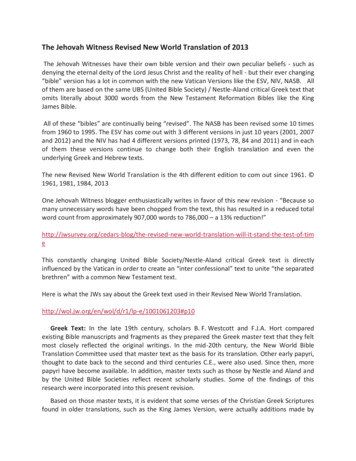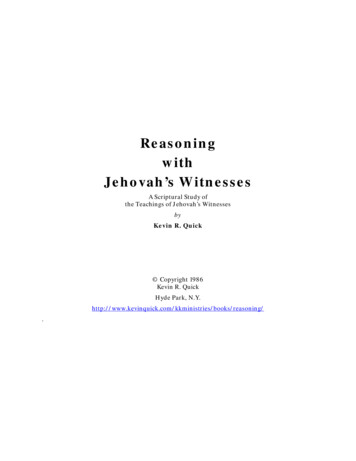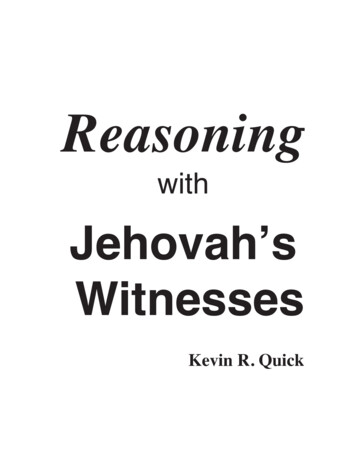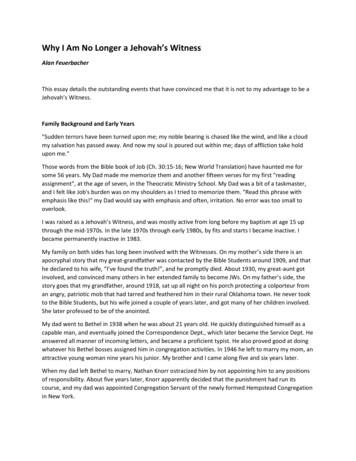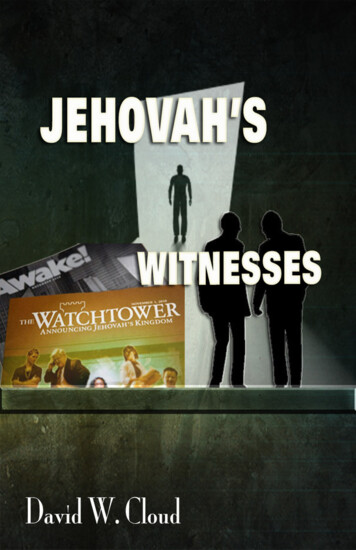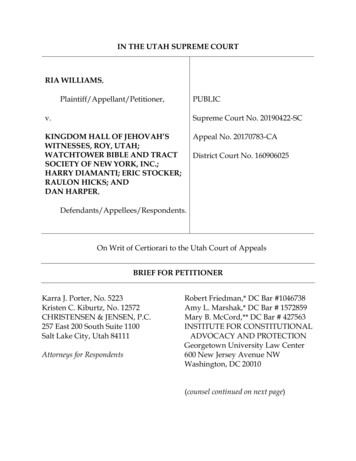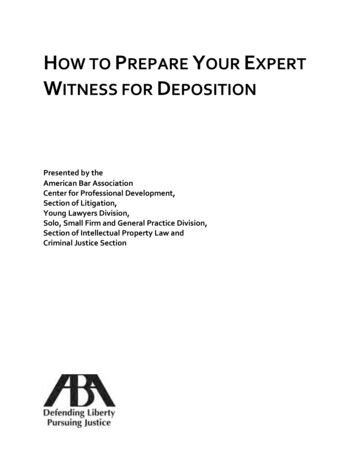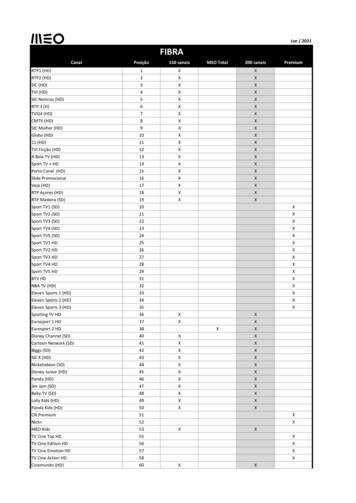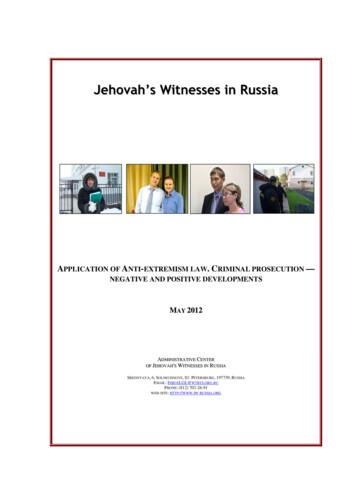
Transcription
Jehovah’s Witnesses in RussiaAPPLICATION OF ANTI-EXTREMISM LAW. CRIMINAL PROSECUTION —NEGATIVE AND POSITIVE DEVELOPMENTSMAY 2012ADMINISTRATIVE CENTEROF JEHOVAH'S WITNESSES IN RUSSIASREDNYAYA, 6, SOLNECHNOYE, ST. PETERSBURG, 197739, RUSSIAEMAIL: INBOXLGL@WTBTS.ORG.RUPHONE: (812) 702-26-91WEB-SITE: HTTP://WWW.JW-RUSSIA.ORG
TABLE OF CONTENTSTABOVERVIEW OF THE SITUATION FACING JEHOVAH’S WITNESSES IN RUSSIA1OVERVIEW OF CRIMINAL CHARGES AGAINST JEHOVAH’S WITNESSES IN RUSSIA2ECHR APPLICATIONS AGAINST RUSSIA INVOLVING JEHOVAH’S WITNESSES3POSITIVE DEVELOPMENTS REGARDING JEHOVAH’S WITNESSES4ATTACHMENTS:71. Character reference for Andrey Raitin (Russian, English)2. Letter of the Administrative Center of Jehovah’s Witnessesin Russia to Russian Minister of Justice, Mr. A. Konovalov,dated 30 May 2012 (Russian, English)3. Letter of the Directorate of the Ministry of Internal Affairsfor the Yaroslavl Region to the (Interdistrict) PrivateSecurity Department of Territorial Agenciesdated 27 March 2012 (Russian, English)4. List of criminal cases under Article 282 of the RF CriminalCode that have been closed8101214
Overview of the situation facing Jehovah’s Witnesses in RussiaThe current situation of Jehovah’s Witnesses was noted by the Council of Europe ParliamentaryAssembly (PACE) Resolution (2012/2505(RSP)) on Russia adopted on 16 February 2012:“Expresses its deep concern about the misuse of anti-extremism legislation involving the illegalimplementation of criminal laws against . . . religious minorities such as Jehova[h]’s Witnesses. . . and the improper banning of their materials on grounds of extremism[.]”—Section K14.In this connection, it is worthy to note the following important events that have taken place sinceDecember 2011. These are only a few striking examples of the general unfavorable situation facingJehovah’s Witnesses.Jehovah’s Witnesses are subjected to criminal prosecution under Article 282 of the CriminalCode of the Russian FederationAkhtubinsk (Astrakhan Region). On 17 February 2012 hearings began in the criminal caseagainst Yelena Grigoryeva, who is accused of disseminating among residents of Akhtubinsk(Astrakhan Region) viewpoints and convictions aimed at abasing the dignity of groups ofcitizens on the basis of religion; disseminating propaganda of the exclusivity and superiority ofher religion over other religions; and offering and distributing printed materials of an extremistnature to said residents. During the consideration of the case it was discovered that practicallyall of the material evidence in the case was obtained illegally. The Akhtubinsk City Courtappointed a repeat linguistic and religious expert study. Consideration of the case has beensuspended until the expert study is submitted to court.Chita (Zabaykalskiy Territory). On 22 December 2011 the Chita District Court commencedconsideration of the criminal case against Andrey and Lyutsiya Raitin. On 8 February 2011searches were conducted of 13 homes of local Jehovah’s Witnesses. During the court sessionsbetween January and May 2012 it was discovered that procedural documents in the case weredrawn-up with serious violations of the Criminal Procedural Code and that documents wentmissing, unauthorized modifications were made, there was evidence of forgery, and so forth.The court was clearly biased against the defense, refusing practically all of their motions andviolating the principle of equality of the parties during the judicial proceedings.Yoshkar-Ola (Republic of Mari El). On 25 January 2012 the Yoshkar-Ola City Courtcommenced consideration of the criminal case against Maksim Kalinin, one of Jehovah’sWitnesses. In the beginning of 2010 officers from the FSB and the Department forCounteracting Extremism conducted a search in Maksim Kalinin’s home. In addition, theyinstalled concealed audio and video surveillance equipment in a hall where religious servicesare held. The equipment was in place for 180 days. Police officers monitored Maksim Kalinin’scorrespondence, including his e-mail. They listened to and recorded the telephoneconversations of Maksim Kalinin and of eight other fellow believers. As a result, additionalsearches were conducted and religious services were disrupted. Witnesses from the prosecutionand several from the defense were questioned in court. The hearings are scheduled to continueon 8 June, and later between 19 June and 1 July 2012.Orenburg (Orenburg Region). On 4 May 2012 investigators together with officers of the FSBDirectorate and the Regional Police Directorate conducted more than 15 searches. On 28 April2012 investigation agencies of the Russian Federation Investigative Committee for theOrenburg Region initiated a criminal case under Article 282(1) of the Criminal Code(incitement of hatred or enmity, as well as abasement of human dignity) in connection withextremist activity of the religious organization of Jehovah's Witnesses in the city of Orenburgand the Orenburg Region. At present, investigative actions intended to establish thecircumstances of the crime committed and to establish which persons supposedly participatedin this crime are ongoing. The criminal investigation continues.
Civil Cases Regarding the Printed Publications of Jehovah’s WitnessesMakarov (Sakhalin Region). On 27 March 2012 the Sakhalin Regional Court reversed thedecision rendered by judges of the Makarov District Court regarding the submission ofProsecutor Sergey Aleksandrov to declare extremist nine publications of Jehovah’s Witnesses,including the booklet Comfort for the Depressed (Attachment 1). The case was remanded for aretrial by the same court.Pristen (Kursk Region). On 29 March 2012 the Pristen District Court terminated the caseagainst the brochure What Happens to Us When We Die?, published by Jehovah’s Witnesses,on the grounds that in 2009 the Rostov Regional Court declared that the brochure does notcontain signs of extremism. However, the Kursk prosecutor continues to seek a ban on anotherfour publications, relying on the conclusions of a local religious expert who considers thatquotations from a book by the famous Spanish philosopher Miguel de Unamuno are extremist,despite the fact that Miguel de Unamuno’s works are published and freely distributed inRussia.Tver (Tver Region). On 12 December 2011 D. V. Stolyarov, prosecutor of the ZavolzhskiyDistrict of the city of Tver, filed an application with the Tsentralniy District Court of the city ofTver to declare extremist the books Learn From the Great Teacher and Reasoning From theScriptures, published by Jehovah’s Witnesses. On 1 February 2012 the court terminated theproceedings to declare the book Reasoning From the Scriptures extremist. It referred to a finaldecision of the Novouralsk City Court of the Sverdlovsk Region rendered in a dispute on thesame subject and the same grounds. However, on 12 April 2012, by the ruling of the TverRegional Court, said decision was reversed—the case has been remanded for a retrial by theTsentralniy District Court of the city of Tver.Uspenskoye (Krasnodar Territory). On 14 February 2012 the Uspenskiy District Court of theKrasnodar Territory rendered a ruling to appoint a psycho-linguistic expert study of yet anotherreligious book published by Jehovah’s Witnesses—“Bearing Thorough Witness” About God’sKingdom, a detailed account of the New Testament Acts of the Apostles.Russian Government Disregards European Court of Human Rights JudgmentRussia has disregarded the 10 June 2010 unanimous ECHR judgment in favor of the MoscowCommunity of Jehovah’s Witnesses, which exonerated them from the false accusations brought by theMoscow prosecutor. The Moscow Community has not been able to re-register after numerous attemptsto do so. In view of this the Administrative Center of Jehovah’s Witnesses in Russia sent a letter of30 May 2012 to the Minister of Justice, Mr. A. Konovalov. In its letter the Administrative Centerrequested that Mr. Konovalov clarify the procedure that Jehovah’s Witnesses should follow to have theMoscow Community reregistered.Others violationsFrom December 2011 through May 2012, 161 incidents of harassment of Jehovah’s Witnesses havebeen reported. Government authorities, including local police officers, have carried out 27 searches ofthe Witnesses’ homes and facilities used for holding worship services; and over 49 instances ofinterference with the Witnesses’ well-known activity of sharing Bible information with others (96individuals were detained). The interferences led to detentions of 96 individuals. The law-enforcementagencies disrupted or interfered with 2 religious meetings (a weekly worship service and largerreligious assembly). Oppressive conduct from the hands of Russian citizens has included 21 assaults(37 believers were hurt) and 13 counts of vandalism.
1STATUS OF CRIMINAL CHARGES AGAINST JEHOVAH’S WITNESSES IN RUSSIAIn his 2011 report, Russian Federation Human Rights Ombudsman Vladimir Lukin expressedparticular concern over attempts to convict believers under Article 282(1) of the RF Criminal Code. Despitethe fact that one of Jehovah’s Witnesses from Gorno-Altaysk was acquitted after two rounds of judicialproceedings (the verdicts were appealed twice), the same charges are being lodged against other Witnesses.Mr. Lukin considers that “criminal prosecution for the dissemination of religious convictions— including bymeans of distributing religious literature—will not withstand criticism.”On March 28, 2012, the SOVA Center submitted to “Interfax” its annual report on the unlawfulapplication of the anti-extremism law. The report noted:“Jehovah’s Witnesses remain one of the primary targets of the movement to “counteract extremism.”The diverse persecution against this religion continues to grow each year. Jehovah’s Witnessescontinue being charged with extremism exclusively because they assert the superiority of their faith. . . We observe that Jehovah’s Witnesses are under constant “anti-extremism” pressure. . . . Duringthe past year, 16 publications of Jehovah’s Witnesses have been unlawfully entered into the list [ofextremist materials].”The following is the summary of the 11 criminal cases opened against Jehovah’s Witnesses in Russia.Three of them are litigated in courts of Akhtubinsk, Yoshkar-Ola and Chita. The criminal case againstAleksandr Kalistratov from Gorno-Altaysk was closed.SUMMARY OF CRIMINAL CASESUnder Article 282 of RF Criminal Code7 June 200922 December 2011Gorno-Altaysk,Altay RepublicCriminal case againstAleksandr KalistratovOn 11 August 2010 Aleksandr Kalistratov, chairman of the LocalReligious Organization (LRO) of Jehovah’s Witnesses “Gorno-Altaysk”,was charged under Article 282(1) of the Criminal Code (CrC) of theRussian Federation (RF) (incitement of hatred or enmity as well asdegrading the dignity of a person). The essence of the charge was that hedistributed publications which after the fact, on 11 September 2009, weredeclared extremist materials by the Rostov Regional Court.The judicial proceedings in this case began on 7 October 2010. Not one ofthe 71 witnesses that were questioned in the Gorno-Altaysk City Courtconfirmed the allegation that Aleksandr Kalistratov incited hatred, enmity,or degraded the dignity of a person. Moreover, on 15 November 2010 theprosecution invited Sergey Bashkatov, an Orthodox priest, as a witness. Hedid not personally know the accused and did not have information abouthis activity; however, he tried to give a negative evaluation of the beliefs ofJehovah’s Witnesses. A reply from the Investigation Directorate of theInvestigation Committee of the RF Prosecutor’s Office for the Tver Regionwas read during the hearing on 19 January 2011, which was received inresponse to the request of the investigator to assist in collecting evidenceagainst Aleksandr Kalistratov. This document stated the following: “Webelieve that there are grounds to request assistance in this matter from theFSB of the Altay Republic and the highest religious Orthodox authority inAleksandr KalistratovBorn: 16 July 1976Jehovah’s Witness since: 1994Summary: “Guidance counselor”by profession ; for almost twoyears worked at his profession inmiddle school but was firedbecause of his religion; has to workas a janitor and buildingmaintenance worker, which allowshim to support himself and hismother materially.
2the Altay Republic.” On 14 April 2011 Judge Marina Sokolovskaya handed down a not-guilty verdictwhich was appealed by the prosecution to the Supreme Court of the Altay Republic.The case was remanded for a new trial with Presiding Judge Marina Kulikova. Besides the witnesses, whothe court questioned again, the prosecutor invited yet another Orthodox priest, Yuriy Balakin. He, the sameas Sergey Bashkatov, did not know the accused and could not explain to the court anything regarding theactions of Aleksandr Kalistratov. After examining the 28 volumes of the case, Judge M. Kulikova rendered aguilty verdict on 3 November 2011. Aleksandr Kalistratov was sentenced to 100 hours of compulsoryservice.The deciding factor in rendering this decision was the pseudo-expert studies: conclusion by Gorno-AltayskState University specialist, Yu. Khvastunova; conclusion by Kemerovo State University specialists,L. Arayeva, M. Yanitskiy, and M. Osadchiy; as well as the conclusion of the Southern Regional Center forJudicial Expert Studies regarding the case of the LRO of Jehovah’s Witnesses “Taganrog” (see descriptionof the case below). This fact was noted by the Ombudsman for Human Rights in Russia, Vladimir Lukin, inhis 2011 report, where he gave the following evaluation of one of these expert studies: “The expert study ofthe literature was carried out at the Kemerovo State University where it seems that there are neitherprofessional religious experts, nor even historians. As a result, by relying on the opinion of the experts (insome other fields of science?) the ‘credulous’ court declared extremist information found in this religiousliterature about the crusades, the inquisition, and the cooperation of the Catholic Church during WorldWar II with Nazi Germany . . . The state prosecutor, and following him the court, found that all this‘seditious’ information is dangerous for society and state, and sufficient for bringing K[alistratov] tocriminal accountability.”The defense appealed this decision, and on 22 December 2011 the Supreme Court of the Altay Republicreversed it, fully acquitting Aleksandr Kalistratov.In the above-mentioned report, Vladimir Lukin summed up the senselessness of all the efforts and resourcesspent by state agencies on this case: “. . . criminal prosecution for disseminating religious convictionsincluding by means of religious literature does not stand up to criticism.”5 August 2011presentTaganrog,Rostov RegionCriminal case againstunidentified individualsOn 5 August 2011 the Investigative Division of the Main Directorate of the Ministry of Internal Affairs ofRussia for the Southern Federal District initiated a criminal case regarding unidentified individuals on thebasis of elements of a crime stipulated in Article 282.2(1) of the RF CrC (organizing the activity of anextremist organization).According to the investigation, unidentified individuals in the city of Taganrog of the Rostov Region carriedout organizational actions, aimed at renewing and continuing the activity of the LRO of Jehovah’s Witnesses“Taganrog,” which was declared extremist by the Rostov District Court on 11 September 2009 andliquidated (on 8 December 2009 the Supreme Court of the Russian Federation upheld this decision). On 25and 26 August 2011 as part of this criminal case and based on the corresponding decisions of the court,searches were conducted in the homes of 20 believers, the majority of whom did not have any connectionwith the activity of the liquidated LRO, but only professed the religion of Jehovah’s Witnesses.During the searches, almost all of the religious literature of Jehovah’s Witnesses, video and audio discs,laptops, computer system units, and personal notes were seized from the believers. On a number ofoccasions the searches started at 6:00 a.m.At the present time, officers of law-enforcement agencies are examining the materials that were seizedduring the searches.
36 September 2011presentCheboksary, Kanash, andNovocheboksarsk, Republicof ChuvashiaCriminal case againstAleksey Nikolayev, FaridMannafov, and Oleg andLiliya MarchenkoOn 6 September 2011 the Investigator of Especially Important Cases of the Department for ExaminingEspecially Important Cases of the Investigative Directorate of the Investigative Committee of the RF for theChuvash Republic, V. N. Nikitin, initiated a criminal case on the elements of the crime stipulated inArticle 282(1) of the RF CrC (incitement of hatred or enmity, as wellas degrading the dignity of a person) against Aleksey Nikolayev, whoresides in the city of Cheboksary.He is accused of the fact that from November 2009 until the present,having hatred and enmity toward the representatives of anotherreligion, he intentionally distributed printed publications included inthe Federal List of Extremist Materials, with the aim of inciting hatredand enmity, as well as degrading dignity of a person or group ofpersons on the basis of attitude toward nko,Liliya MarchenkoOn 7 and 8 September 2011, nine searches of residences of Jehovah’sWitnesses were conducted in the cities of Cheboksary, Kanash, andNovocheboksarsk as part of the criminal case.The searches were also conducted in four buildings that are rented by the believers to hold their religiousservices. At the same time, in all four instances, religious services were disrupted, personal information ofthose present was taken and they were questioned and personally searched as well. In the city of Konash,approximately 20 persons (including minors) who were present at the religious service were brought to thelocal police station, where they were subjected to questioning, and compulsory photographing andfingerprinting.In addition, three of the believers, Aleksey Nikolayev, Farid Mannafov, and Oleg Marchenko, were detainedand held for 48 hours in a temporary detention facility at the Ministry of Internal Affairs for the ChuvashRepublic (from 7 to 9 September 2011).All together, over the period of two months, 19 searches were conducted starting on 7 September 2011.Currently, four persons are charged in the criminal case: Aleksey Nikolayev, Farid Mannafov, and Oleg andLiliya Marchenko (all except Aleksey reside in the city of Kanash). Three more believers are consideredsuspects: Rodion Vasilyev (Cheboksary), Nikolay Gavrilov (Cheboksary), and Yekaterina Mytnitskaya(Kanash).In October of 2011 Investigator Nikitin forwarded informational materials of Jehovah’s Witness that wereseized during the investigation to the Chuvash Forensic Expert Study Laboratory of the RF Ministry ofJustice for examination. At the same time, 17 more composite psycho-linguistic expert studies werecommissioned in the case. All together, approximately 1,300 copies of printed publications were submittedfor examination, including video and audio discs produced by Jehovah’s Witnesses.The searches continued through November of 2011 in the city of Cheboksary, through February of 2012 inthe city of Alatyr, and through March of 2012 in the city of Novocheboksarsk. In total, over the period ofeight months from the time the criminal case was initiated, 24 searches were conducted as of 8 May 2012,including four searches in Kingdom Halls.Complaints have been filed with the Supreme Court of the Chuvash Republic against 16 searches of theresidences of Jehovah’s Witnesses that were conducted from October of 2011 until April of 2012 on thebasis of being unlawful and groundless; almost all were examined and denied by the same Judicial Chamber.
4On 16 March 2012 a search was conducted of the apartments of Ira Korneva, Yulia Demidova, and NinaLobatorina, who reside in the city of Novocheboksarsk. The next day all three were questioned one by oneby Police Operative I. Ye. Avtayev from the Directorate of the FSB of Russia for the Chuvash Republic inthe city of Novocheboksarsk. He exerted pressure on the believers, harshly forbidding them to contact theirattorney and threatened to arrest them. A complaint has been filed with the Prosecutor’s Office for theRepublic against said actions of the Police Operative from the Directorate of the FSB. However, in thebeginning of May of 2012 a response was received from the Prosecutor’s Office stating that there were noviolations in the actions of I. Ye. Avtayev.Beginning of 2010presentYoshkar-Ola, Republic ofMari ElCriminal case againstMaksim KalininBack in early 2010, officers from the FSB and the Department for Counteracting Extremism conductedsurveillance of the community of Jehovah’s Witnesses in this region.The Supreme Court of the Mari El Republic issued to law-enforcementagencies two warrants in order to conduct a search in the home ofMaksim Kalinin, one of Jehovah’s Witnesses, and to install in the hallwhere religious services are held a hidden audio and video surveillancefor 180 days. In addition, officers of law-enforcement agenciesmonitored the correspondence of Maksim Kalinin, including his email,and listened to and recorded not only telephone conversations ofMaksim, but of eight other believers.On 6 August 2010 Investigator for Especially Important Cases of theYoshkar-Ola Investigation Department for the Mari El RepublicMaksim Kalinininitiated a criminal case under Article 282(1) of the RF CrC on thebasis of the information collected by the police and the FSB. On 9 August 2010 the Yoshkar-Ola City Courtsanctioned searches of the premises used for religious services and of six homes of members of the localcommunity of Jehovah’s Witnesses.On 10 August 2010 police and special task forces OMON interrupted the religious service, which wasattended by approximately 90 persons. Police officers searched all those in attendance, as well asconfiscated religious literature and personal belongings. During that same evening police searched at leastfour homes of Jehovah’s Witnesses and confiscated religious literature, computers, letters, and documents ofthe local community of Jehovah’s Witnesses. The searches lasted until 4:00 a.m. (Afterward the believersfiled complaints against these actions, and on 27 September 2010 Yoshkar-Ola City Court found that thesearches and personal searches of Jehovah’s Witnesses in Yoshkar-Ola were unlawful.)The following day, 11 August 2010, Maksim Kalinin was detained and escorted to the police station. He wasinformed that a criminal case was initiated against him. On 17 January 2011 Maksim Kalinin was chargedwith violating Article 282(1) of the RF CrC. On 31 January 2011 he was presented with the charge thesecond time and a preventative measure in the form of personal recognizance was chosen.On 25 January 2012 the Yoshkar-Ola City Court began to examine this case. The court dismissed the motionof the defendant’s attorneys to return the case to the prosecutor’s office but admitted to the case file a seriesof excerpts from various textbooks and Orthodox literature. During the hearing that took place on the 8th ofFebruary, Prosecutor Ye. Voronchikhina was trying to ascertain the specifics of the legal activity ofJehovah’s Witnesses by questioning seven of Maksim Kalinin’s fellow believers. All those questionedexplained that they have never noticed even a hint of incitement to hatred in his personality or behavior. Thehearings on 28 and 29 of February were attended by the representative of a non-governmental organizationAmnesty International, along with a member of the local human rights organization Man and Law.
5During the court hearings in March and April other witnesses were questioned as well, including AleksandrKalistratov (see above the section on the criminal case initiated against him). A. Kalistratov explainedvarious aspects of the activity of Jehovah’s Witnesses and specifics in his criminal case that are similar tothose in Maksim Kalinin’s case. The following hearings took place on 15-17 May 2012. The court hearingsare to resume on 8 June 2012 and continue on 19 June-1 July 2012.6 February 2011presentAkhtubinsk, AstrakhanRegionCriminal case againstYelena GrigoryevaOn 6 February 2011 a criminal case was initiated against Yelena Grigoryeva under Article 282(1) of theRF CrC. After two days, on 8 February, the investigator and officersof CCE and FSB, acting on the basis of the decision of the AkhtubinskCity Court, conducted searches in not only her home, but also in theprivate residences of five other Jehovah’s Witnesses in the city ofAkhtubinsk. Six cassation appeals have been filed with the AstrakhanskRegional Court, which were denied. After the visit of certain officials toYelena Grigoryeva’s place of work, she was forced to resign from herjob on 11 February 2011 (social service institution).On 17 February 2011 Yelena Grigoryeva was charged underArticle 282(1) of the RF CrC for “publicly disseminating among Yelena Grigoryevaindividuals living on the territory of the Akhtubinskiy District of the Born:18 March 1967Astrakhan Region, in public areas and places of residence, views and1994convictions aimed at degrading the dignity of a group of citizens, on the Jehovah’sWitnesses since:basis of their attitude toward religion, promoting exclusivity and Summary: Worked in the past as asuperiority of the religion being preached by representatives of the social-worker and as a taxreligious organization of Jehovah’s Witnesses, over other religions, and inspectorate. A caring mother andoffering and passing out for review printed publications containing grandmother.publications of an extremist nature included on the Federal List of Extremist Materials.” A comprehensivepsycho-linguistic expert study on the case was appointed and was conducted by experts of the SouthernExpert Center in the city of Volgograd, in particular by L. Belyanskaya. Also a religious expert study wasappointed to be conducted by A. Istileyeva, expert of the Scientific-Research Center of Judicial ExpertStudies of the Astrakhan Region.On 2 February 2012 Yelena Grigoryeva was handed the bill of indictment signed by the acting prosecutor ofthe city of Akhtubinsk, Aleksey Tupikov. The case was filed in court and on 17 February hearings began inthe Akhtubinskiy District Court.During the examination of the case, it became clear that practically all material evidence for the case wascollected in violation of the law. The witnesses questioned in the case asserted that Yelena Grigoryeva doesnot have anything to do with inciting inter-religious hatred.Moreover, the above-mentioned religious expert study by A. Istileyeva does not stand up to criticism.Doctor of philological sciences, Anatoliy Baranov, director for the department of ExperimentalLexicography of the V. V. Vinogradov Russian Language Institute of the Russian Academy of Sciencestestified in court on 11 April 2012 that the conclusion—on the basis of which the believer is beingprosecuted for inciting enmity—was made without the use of scientific methods and represented only asubjective opinion about the religion of Jehovah’s Witnesses. In contrast, the scientific research suggeststhat any kind of incitement to enmity is absent in the religious publications of Jehovah’s Witnesses. On24 April 2012 the defense counsel presented to the court an authorship analysis proving that the argumentsand conclusions of historian A. Istileyeva, who found signs of extremism in the publications of Jehovah’s
6Witnesses, are not independent and are almost entirely taken from other sources. This conclusion wasprepared by expert A. Smirnov, employee of the Laboratory of Applied Linguistics in Moscow.During the court hearings that took place from 24 to 27 April 2012, expert L. Belyanskaya and severaldefense witnesses were questioned. As a result, the Akhtubinskiy District Court appointed a secondlinguistic and religious expert study, which is to be performed by specialists from the Saratov Laboratory ofJudicial Expert Studies of the Russian Ministry of Justice. The examination of the case was postponed untilthe expert study is submitted to court.21 April 201023 April 2012Chelyabinsk,Chelyabinsk RegionCriminal case against theorganized group, membersof the LRO of Jehovah’sWitnesses “Chelyabinsk”On 21 April 2010 A. Frolov, Investigator of Especially Important Cases of the Investigative Department forthe city of Chelyabinsk of the Investigation Directorate of the Investigative Committee of the RussianProsecutor General’s Office for the Chelyabinsk Region rendered a ruling to initiate a criminal case underArticle 282(2) of the RF CrC (incitement of hatred by an organized group) and began investigation.The Traktorozavodskiy District Court later issued orders to search private residences. On 12 May 2010 lawenforcement agencies conducted 12 searches of homes and work places of Jehovah’s Witnesses, as well asfacilities for holding religious services. Then, in 2010, an expert study of religious literature was appointed.At the same time, the investigator denied the motion to provide the citizens, whose houses were searched,and their attorney the opportunity to review the ruling to appoint an expert study on the religious literaturethat was seized from them. Complaints were filed against this refusal in court. However, the court of firstinstance and the court of cassation denied the complaints.On 23 April 2012 a ruling to terminate the criminal case was rendered. From this ruling the believers learnedthat investigative agencies had initiated two criminal cases; the first one, on the basis of distributingliterature that was declared extremist; and the second, for public study of the book Come Be My Follower ata religious meeting. Apparently, both cases were consolidated into one action.The
Tver to declare extremist the books Learn From the Great Teacher and Reasoning From the Scriptures, published by Jehovah’s Witnesses. On 1 February 2012 the court terminated the proceedings to declare the book Reasoning

